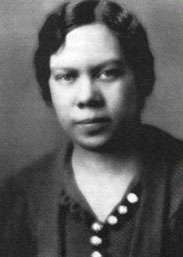Ruth Winifred Howard
Ruth Winifred Howard Beckham (March 25, 1900 – February 12, 1997) is most notably famous for her psychological work concerning students with special needs at Children's Provident Hospital School. She is among the first African American women to earn a (doctorate degree) Ph.D in Psychology,[1][2] and was an active participant in the American Psychological Association, the International Council of Women Psychologists, the American Association of University Women, the National Association of College Women (an African American-based group), and the Women's International League for Peace and Freedom (apa.org). She also received instruction from Florence Goodenough.[3]
Ruth Howard | |
|---|---|
 | |
| Born | March 25, 1900 Washington D.C. |
| Died | February 12, 1997 (aged 96) Washington D.C. |
| Occupation | Psychologist |
| Known for | Being one of the first African American women to receive a Ph.D. in Psychology |
| Spouse(s) | Albert Sidney Beckham |
Early life
Ruth Winifred Howard was born in Washington D.C. on March 25, 1900.[4] She was the daughter of Reverend William J. Howard and his wife Alverda Brown Howard, and she had 7 siblings. As a child, she enjoyed reading and aspired to be a librarian.[2] Howard's mother strongly encouraged her reading habit. She attributed her father's active work in the community as one of the main sources of her passion to help other people, and would influence her in her work with disabled children. In 1916, she graduated from the old M Street High school, now known as Dunbar High School.[5]
Education and career
After graduating from high school, Howard attended Simmons College in Boston, Massachusetts where she majored in social work. In 1921, she received her bachelor's degree and moved to Cleveland, Ohio where she began her work as a social worker. Shortly after, she went back to Simmons College and received her master's degree in 1927.
Beckham received the Laura Spelman Rockefeller fellowship in 1929 and again in 1930. With this fellowship, she attended the Teacher's College and School of Social Work at Columbia University from 1929-1930 and studied child psychology at the Child Development Institute at the University of Minnesota from 1930-1934.
In 1934, she received her PhD in psychology and child development from the University of Minnesota.[6]
Beckham studied the development of triplets for her doctoral dissertation and concluded that triplets were less developed in general abilities compared to single children. She received an internship at the Illinois Institute for Juvenile Research after receiving her doctorate and eventually began her own clinical psychology based private practice.
From 1940-1964, Beckham co-directed the Center for Psychological Services along with her husband, Albert Sidney Beckham. During this time, Beckham also held the staff psychologist position at the Provident Hospital School of Nursing in Chicago, which trained African American nurses. Additionally, she held the position of a psychological consultant at Florida and Missouri schools of nursing while lecturing, working at psychology clinics and consulting for other organizations.
From 1964-1966, she worked at the McKinley Center for Retarded Children as a psychologist. Afterwards, she worked at Worthington and Hurst Psychological Consultants as a staff psychologist until 1968. After that, she held became a psychologist for the Chicago Board of Health until 1972.[2]
Community organizations
Howard helped organize and even found several different organizations that provided support for minorities, especially in the medical field. These organizations included: American Psychological Association, the International Council of Women Psychologists, the American Association of University Women, the National Association of College Women, and the Women's International League for Peace and Freedom.
Personal life
In 1934, she married Albert Sidney Beckham.[5] and moved to Chicago, Illinois, where she remained until 1987. Beckham, himself died in 1964. Howard continued her work in Chicago as a consultant for children's programs at the Abraham Lincoln Center and Worthington and Hurst Psychological Consultants, a psychologist for the McKinley Center for Retarded Children, on the Chicago Health Board, Mental Health Division, and her private practice for another four years. She died on February 12, 1997 in Washington, DC.[7] She was a member of Delta Sigma Theta sorority.
Late life
Howard's husband died in 1964. She continued her work in Chicago as a consultant for children's programs at the Abraham Lincoln Center and Worthington and Hurst Psychological Consultants, a psychologist for the McKinley Center for Retarded Children, on the Chicago Health Board, Mental Health Division, and her private practice for another four years. Dr. Howard died on February 12, 1997 in Washington, DC.
Footnotes
- "Featured Psychologist: Ruth Howard, PhD". American Psychological Association. Retrieved 23 March 2014.
- Patrick, Moore (1999). Notable Black American Scientists. Farmington Hills, Michigan: Gale Research. pp. 22–23. ISBN 0-7876-2789-5.
- Saltzman, Ann L. (Spring 2001). "Ruth Winifred Howard* (1900-1997)". The Feminist Psychologist, Newsletter of the Society for the Psychology of Women, Division 35 of the American Psychological Association, Volume 28, Number 2.
- Held, Lisa (2010). "Profile of Ruth Howard". Psychology's Feminist Voices Multimedia Internet Archive.
- Guthrie, R.V. (1998). p. 178.
- Rossiter, Margaret W. (1982). Women scientists in America : struggles and strategies to 1940. Baltimore: Johns Hopkins University Press. ISBN 0-8018-2443-5. OCLC 8052928.
- Saltzman, Ann L. "Biography of Ruth Winifred Howard". American Psychological Association. Society for the Psychology of Women. Retrieved 23 March 2014.
References
- Guthrie, R.V. (1998). Production of Black Psychologist in America. Even the Rat Was White (2nd ed.). Boston: Allyn and Bacon, 155-212.
- Biography of Ruth Winifred Howard at Psychology's Feminist Voices
- Biography of Ruth Winifrd Howard
- Featured Psychologist: Ruth Howard Ph.D
- Educator and more, Ruth w. Howard Beckman